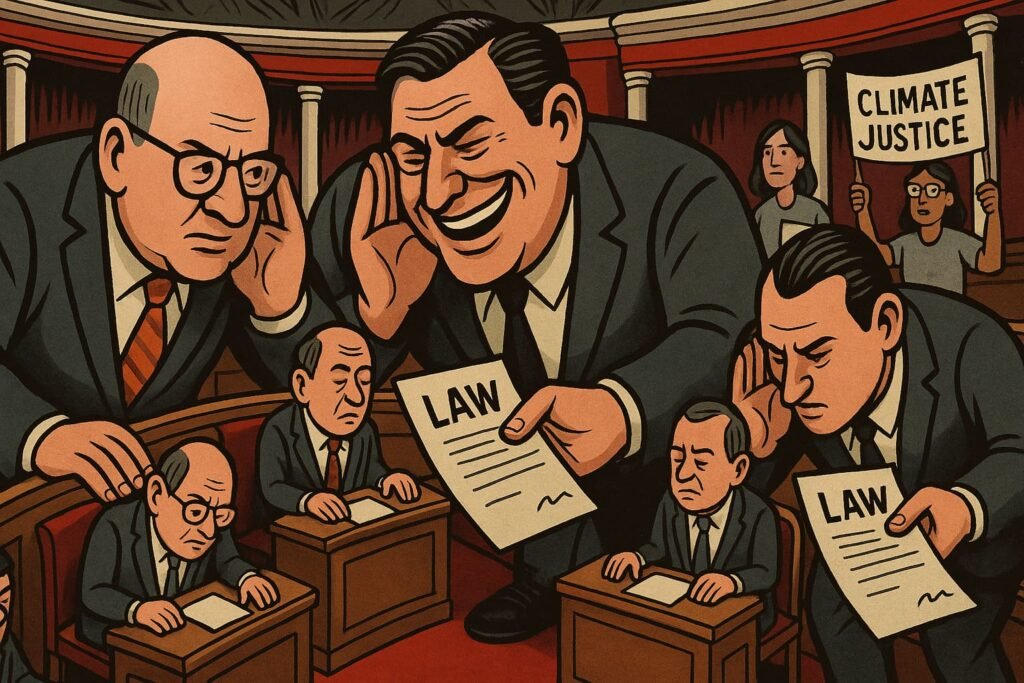Lobbying & Influence Explained – How Corporations Bend the Law
From Democracy to Boardroom Rule
We’re told laws come from parliaments and presidents. Citizens vote, politicians debate, and then rules are passed for the common good. That’s the fairy tale.
In reality? Many laws are written in boardrooms, whispered in lobby corridors, and pushed by multinationals that treat politicians like middle managers. Outrage campaigns, “expert studies,” and activist NGOs often serve as the moral cover. The end result: corporations bend the law while pretending democracy is still in charge.
Table of contents
What Is Lobbying Really About?
Officially, lobbying is about “representation.” Businesses, unions, and NGOs present their case to lawmakers. In practice, it’s cash, access, and pressure.
Multinationals spend billions to make sure regulations “just happen” to fit their needs. Lobbyists draft bills, lawyers fine-print the loopholes, and politicians sign on the dotted line. All perfectly legal. All perfectly undemocratic.
The Corporate Playbook
How do corporations actually bend the law? A few classics:
- Revolving Door – Yesterday’s minister is today’s lobbyist, tomorrow’s CEO. Policy is just career planning.
- Think Tank Laundering – Fund a “non-partisan” institute to publish studies that magically align with your business interests.
- Trade Treaties – Lock governments into rules they can’t escape. Voters change their minds, but treaties stay forever.
- Regulatory Capture – Put ex-executives in charge of regulating their old industry. Fox, meet henhouse.
- NGO Sponsorship – bankroll activist groups to push laws that create markets for your “solutions.”
Activism as Cover Story
Corporations rarely lobby in their own name anymore. It looks bad. So they outsource moral pressure:
- Outrage Campaigns – Hashtags, petitions, protests — often quietly funded or amplified by corporate donors.
- Moral Framing – Laws aren’t presented as “good for business,” but as “progress,” “equity,” or “climate justice.”
- Brand Endorsements – Rainbow logos and ESG pledges turn corporate lobbying into a “public duty.”
The trick? Wrap profit in virtue. It’s lobbying in drag.
Case Studies – How Laws Get Bent
- Big Tech & Censorship – Governments outsource speech policing to platforms. Politicians avoid blame, Big Tech gains power.
- Pharma & Patents – Intellectual property laws stretched so far they strangle competition and keep prices sky-high.
- Green Mandates – Climate pledges written in ways that benefit big energy and crush smaller rivals.
- HR & DEI Rules – New workplace laws that sound inclusive but create compliance costs only large firms can swallow.
Who Really Benefits?
Not citizens. Not workers. Not small businesses.
- Multinationals – lock in profits, kill competition.
- Executives – more rules = more bureaucracy = more job security.
- Politicians – outsource responsibility, pose as moral leaders, collect post-office jobs.
The losers? Ordinary people and small firms who pay higher costs, get fewer choices, and live under rules nobody voted for.
Why It Matters
Lobbying turns democracy inside out. Laws become tools of the powerful, not protections for the public. Activism becomes camouflage for profit. Politicians become administrators of corporate strategy.
When corporations bend the law, the law stops bending back. And the people it was supposed to serve are left with nothing but the bill.
Related Links:
👉 Corporate Power Explained – When Multinationals Rule Nations
👉 Managerial Capitalism Explained – When Managers Replace Owners
👉 DEI Explained – Inclusion for Sale
👉 For the bigger picture of how corporations gained their power, visit The Power of Business & Corporations Explainer Hub.
FAQ
What is lobbying in plain English?
It’s corporations paying insiders to write rules in their favour.
Is lobbying legal?
Yes. That’s the point. It’s corruption with paperwork.
How do corporations hide their influence?
Through NGOs, think tanks, PR campaigns, and “studies” that make corporate interests look like moral imperatives.
Who loses out?
Small businesses, workers, and citizens. The system is designed to raise costs for outsiders and protect insiders.
Why is lobbying dangerous?
Because it bypasses democracy. Decisions look legitimate, but the real power lies with unelected corporate managers.



